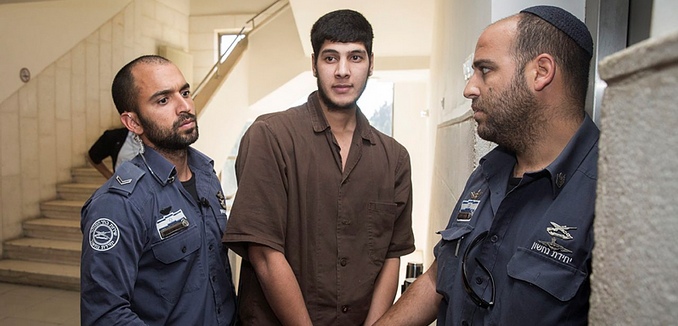A member of the Palestinian terrorist group Hamas was indicted on Tuesday for plotting to carry out a suicide bombing on a Jerusalem bus, Israel’s internal security agency said.
Muhammad Fuaz Ibrahim Julani, a 22-year-old Palestinian resident of eastern Jerusalem, was arrested by the Shin Bet on September 9, several days before his attack was set to take place, The Times of Israel reported.
Julani purchased the chemicals necessary to make the explosives with NIS 7,000 ($1,850), which he received from a Hebron resident identified only as “Abu Muhammed,” according to his indictment. He also reportedly tested the chemicals with Abu Muhammad, and said days before the planned attack that “this is the way of God.”
Before deciding to carry out the bombing in the Pisgat Ze’ev neighborhood of Jerusalem during the Muslim holiday of Eid al-Adha, which was observed from September 12 to 16 this year, Julani looked into a number of other possible attacks. He told the Shin Bet that he had considered “a shooting attack with an AK-47 assault rifle near the Hizme checkpoint; bombing a store where he had worked in 2011; throwing an improvised explosive device at the checkpoint in Shuafat; and pipe bomb attacks in high-traffic locations of Jerusalem, like the bus station and the Malha shopping mall,” the Times wrote.
A year ago, Julani bought a six-inch knife with the intent of carrying out stabbing attacks in Pisgal Ze’ev, but changed his mind out of fear that his parents’ house could be demolished as a result. (Israeli authorities demolish the houses of Palestinian terrorists in order to provide a financial disincentive for killing Israelis, which the Palestinian Authority rewards with salaries.)
At the time that Julani was arrested, he already possessed many of the components needed to create a bomb, including nails to increase the damage of the blast.
Hamas operatives in the Gaza Strip contacted Julani over the internet to help him plan the bombing and encouraging him to recruit accomplices. “This investigation reiterates and highlights the unrelenting effort by Hamas operatives in the Gaza Strip to instigate severe terror attacks in Israel and the West Bank,” the Shin Bet said.
Shortly after a Palestinian terrorist killed two Israelis and wounded six others during a shooting spree in Jerusalem on Sunday, Hamas claimed the attacker as one of its own and called on its operatives in the West Bank to prepare “for a new phase of confrontation.”
The Shin Bet in January announced the arrests of two Hamas terror cells with members who lived in Jerusalem. One of the cells was plotting to assassinate Israeli Prime Minister Benjamin Netanyahu, while the other was in the “advanced planning stages” of a kidnap/murder plot.
In addition to recruiting Palestinians in the West Bank and Jerusalem to attack Israelis, Hamas is pouring significant resources into developing its terrorist infrastructure in Gaza.
The Shin Bet in August announced that it arrested Mohammad el-Halabi, the top Gaza official of the Christian charity World Vision, for funneling millions of the group’s funds to Hamas. The money was largely used to buy materials necessary to construct military outposts and tunnels, as well as pay fighters, the security agency said.
That month, the Shin Bet also charged Waheed Borsh, an engineer with the United Nations Development Program, with aiding Hamas in Gaza. Borsh confessed that he had helped Hamas build a military jetty in northern Gaza to support the group’s naval forces.
Israeli Foreign Ministry Director General Dore Gold announced in May that Hamas is confiscating 95 percent of cement that enters Gaza. “From our own investigations we found that out of every 100 sacks of cement that come into the Gaza Strip [from Israel], only five or six are transferred to civilians,” he stated. Hamas uses the cement to build and expand its network of tunnels.
The IDF uncovered two Hamas tunnels that breached Israeli territory in the spring. Hamas used its tunnel network during the 2014 war to infiltrate into Israel, and has since continued its efforts to rebuild and improve its underground infrastructure.
Gen. Yossi Kuperwasser, formerly the head of the research division of Israeli military intelligence and later the director general of the Ministry of Strategic Affairs, told reporters in May that the discovery of the tunnels was a sign that Hamas was preparing for another war against Israel. He added that the tunnel digging means that “they definitely invest a lot in making the necessary preparations so that in the next round, when they decide to start it, they will be able to inflict the heaviest damage on Israel, including through those tunnels.”
[Photo: Hadas Parush / Flash90 ]




